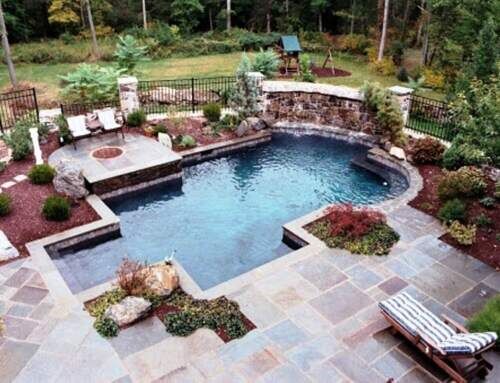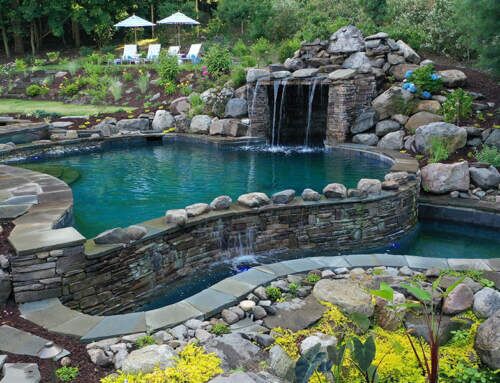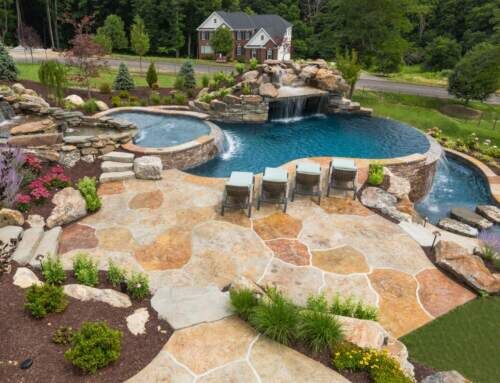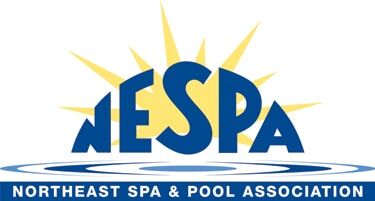What’s the most important thing that happens in your pool — besides the annual Marco Polo tournament?
That’s right — the cleaning. Pool sanitization keeps the water clear and prevents the transmission of contaminants and infectious diseases.
There are lots of options for pool sanitizing. But the best pool sanitizer system is the salt chlorine generator; also known as a salt chlorine pool system.
It’s a pool sanitizing system that our pool maintenance experts recommend. The salt chlorine generator, which uses a salt cell, has revolutionized swimming pool care.
How does this pool equipment work? It’s pretty fascinating. Let’s take a look.
What Is A Pool Salt Cell?
A salt chlorine generator uses common table salt to produce all the chlorine a pool needs, safely, effectively, and automatically. Salt chlorinators have two major components: the cell and the control board.
The cell is the part of the system that actually converts salt to chlorine. Water passes through the cell and over solid titanium plates that are coated with either ruthenium or iridium, both naturally occurring metals. A charge is sent to the cell from the control board and electrolysis occurs, resulting in the production of chlorine.
Yes, We Said Chlorine
Here at Neave Pools, we hear the same complaint over and over: People say they hate chlorine and they’d rather have chlorine alternatives.
We know why. Commercial pools typically keep chlorine at high levels, causing burning eyes and faded swimsuits, so chlorine has a pretty bad reputation.
But don’t blame chlorine as a product. It does a fine job sanitizing your pool. Where the problem comes in is human error — pool owners putting too much of it in their pool.
The pool industry has determined the amount of chlorine levels needed to kill bacteria and algae is 1 to 3 parts per million.
At those water quality levels, you hardly notice chlorine. But because of the bad reputation of chlorine, an industry sprang up to offer pool sanitation options that use less chlorine. But no pool sanitizing system can make water chemistry 100% chlorine-resistant.
The Great Thing About The Salt Cell For Swimming Pools
Chlorine haters, take note: a salt chlorine generator is like cruise control for your in-ground pool. It keeps a low, even, safe level of chlorine all the time — without the drawbacks of manually adding chlorine pool chemicals.
No chlorine tablets, liquid or granules to add, which means no human error. That means less skin and eye irritation than in traditional chlorine swimming pools.
Another advantage: A pool salt cell eliminates the problems caused by the inert materials in chlorine tablets.
If you’ve ever read the ingredients on your chlorine tablets, you noticed it said they’re 45 percent chlorine and 55 percent “inert materials.” Those inert ingredients mess with other variables in your pool.
For one thing, they lower the pH in your water. Did you ever notice in the pool supply aisle how pH decrease products are sold in little tubs, but pH increase products are sold in giant 20 lb. containers?
Salt water pool chlorine produces nearly neutral pH levels, so few additional chemicals are required to balance your pool’s pH levels.
The Average Cost for a Pool Salt System
The cost of a pool saltwater system is about $2,000. You replace the salt cell every 5 to 7 years, at a cost of several hundred dollars.
Buying a salt chlorine generator might take five years to pay for itself, compared to buying and adding your own chlorine, but the lifestyle benefits are immediate. Your pool water is always clean, and there’s no green water when you get back from vacation.
Pool System Alternatives
As we said earlier, there are several different ways to sanitize your pool. While the salt chlorine generator is our favorite here at Neave Pools, here’s a quick look at the other options:
- With chlorine feeders, you fill the chlorine feeder with chlorine tablets or sticks, select a setting on the dial and the chlorine is released into the pool. When it’s empty, you refill it.
- The ozone gas method uses a ozone generator that combines oxygen with electricity. Ozone gas helps control the water clarity and appearance but doesn’t sanitize and kill bacteria, so you still need to add a low level of chlorine.
- In the ultraviolet (UV) method, pool water circulates through a chamber that destroys or inactivates microorganisms by exposing them to UV light, however, does not oxidize the water, so you still need to add a low level of chlorine or add an oxygenator to the UV system.
- An ionizer uses a low electric current to create copper and silver ions that attract and kill algae, bacteria, and viruses. While very effective, this is a slow-acting and very technical approach to pool sanitization.
- Two alternative chemicals to chlorine include bromine and biguanide. Bromine is similar to chlorine in terms of sanitizing, but it’s less stable and will degrade from the sun’s UV rays. Biguanide attracts bacteria to it, and then penetrates the germs’ cell wall, killing the bacteria. These two chemical alternatives to chlorine require close, frequent monitoring.
Having a Chlorine-Free Pool Is Possible … And Expensive
The ultimate in swimming pool sanitization, using a bio pool is the only truly chlorine-free pool.
You build a smaller pool next to your luxury pool, like a shallow pond. Water is piped from the swimming pool to the pond, which overflows and spills back into the pool. Meanwhile, rocks and plant life in the pond treat the water — it gets oxygen as it runs over rocks.
They’re still very new here in the U.S. and very expensive to build. But they cost nothing to operat
Go With The Pool Sanitation System Neave Trusts
Neave Pools has pool service and maintenance professionals on staff who are trained in proper pool sanitizing techniques. We’ll advise you on how to best keep your pool water clean, safe and sparkling.
We offer safe chlorine and chemical alternatives for pool sanitation.
Neave Pools can develop a schedule based on what you need so that one of our certified professionals can become your personal pool chemist during the summer months, ensuring your pool water is of the highest quality.
If you’re in Hudson Valley, call (845) 463-0592. Westchester, call (914) 271-7996. Cold Spring, call (845) 463-0592, and in Connecticut, call (203) 212-4800. Or fill out our contact form on this page, and we’ll get in touch with you to schedule a complimentary swimming pool consultation.


























